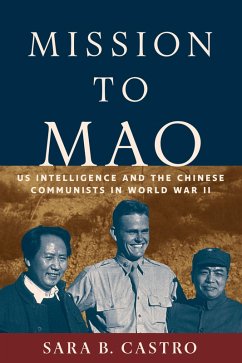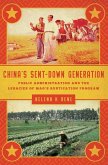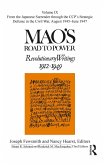An innovative history of US intelligence officers on the ground and the first official contacts between the United States and the Chinese Communist Party
From 1941 to 1947, the United States planted a liaison mission in the headquarters of Chinese Communist forces behind the lines. Nicknamed the "Dixie Mission," for its location in "rebel" territory, it was an interagency delegation that included intelligence officers from the Office of Strategic Services (OSS).
Mission to Mao is a social history of the OSS officers in the field that reveals the weakness of US intelligence diplomacy in the 1940s. Drawing on over 14,000 unpublished records from five archives as well as white papers and memoirs from the participants, Sara B. Castro demonstrates how the OSS officers clashed with political appointees and Washington over the direction of the US relationship with the Chinese Communists. Initially, the OSS officers were sent to gather intelligence that would help the war effort against Japan, but interagency and political conflicts erupted over whether or not the mission would later involve operations with the Communists. Castro shows how potential benefits for the war effort were thwarted by politicization and the OSS officers' own biases and blind spots.
Mission to Mao is a fresh look at US intelligence in WW II China and takes readers beyond the history of "China hands" versus American anticommunists, introducing more nuance.
From 1941 to 1947, the United States planted a liaison mission in the headquarters of Chinese Communist forces behind the lines. Nicknamed the "Dixie Mission," for its location in "rebel" territory, it was an interagency delegation that included intelligence officers from the Office of Strategic Services (OSS).
Mission to Mao is a social history of the OSS officers in the field that reveals the weakness of US intelligence diplomacy in the 1940s. Drawing on over 14,000 unpublished records from five archives as well as white papers and memoirs from the participants, Sara B. Castro demonstrates how the OSS officers clashed with political appointees and Washington over the direction of the US relationship with the Chinese Communists. Initially, the OSS officers were sent to gather intelligence that would help the war effort against Japan, but interagency and political conflicts erupted over whether or not the mission would later involve operations with the Communists. Castro shows how potential benefits for the war effort were thwarted by politicization and the OSS officers' own biases and blind spots.
Mission to Mao is a fresh look at US intelligence in WW II China and takes readers beyond the history of "China hands" versus American anticommunists, introducing more nuance.
Dieser Download kann aus rechtlichen Gründen nur mit Rechnungsadresse in A, D ausgeliefert werden.









